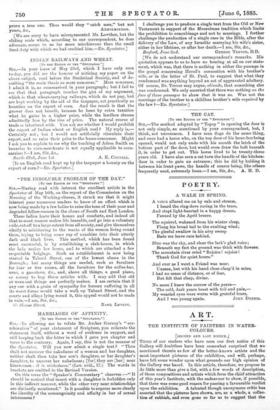INDIAN RAILWAYS AND WHEAT.
[To TILE EDITOR Oy THE " SPECTATOR:1
Sta,—In your issue of May 23rd, which I have only seen to-day, you did me the honour of noticing my paper on the above subject, read before the Statistical Society, and of describing "the main thesis as mere nonsense." Mere nonsense, I admit it is, as summarised in your paragraph ; but I fail to see that that paragraph touches the gist of my argument, which is that wheat-carrying railways, which do not pay, but are kept working by the aid of the taxpayer, act practically as bounties on the export of corn. And the result is that the grower does not benefit, because he loses by extra taxation what he gains in a higher price, while the landless classes admittedly lose by the rise of price. The natural course of trade is interfered with. You ask me whether I would prohibit the export of Indian wheat or English coal ? My reply is,— Certainly not ; but I would not artificially stimulate their export, and so raise their price to the home-consumer. Might I ask you to explain to me why the teaching of Adam Smith on bounties to corn-merchants is not equally applicable to corncarriers ?—I am, Sir, &c.,
Savile Club, June 1st. A. K. CONNELL. [Is an English road kept up by the taxpayer a bounty on the export of corn P—En. Spectator.]


































 Previous page
Previous page